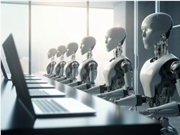Recently, EY released a survey targeting 15,000 employees, showing that nearly two-thirds of the respondents felt their workload had become heavier over the past year. Although the application of AI technology is becoming increasingly widespread, Kim Birt, EY's global head of human resources consulting, pointed out that AI is not the only reason for this phenomenon.

Image source note: The image was generated by AI, and the image licensing service provider is Midjourney
The survey shows that the pressure faced by employees mainly comes from concerns about their own skills, lack of proper training, and uncertainty about the impact of new technologies. These factors collectively affect employees' mental state, making many feel physically and mentally exhausted. Especially when it comes to learning new skills, employees often have to find a balance between heavy workloads and self-improvement.
Birt said that although the use of AI is increasing, 88% of respondents use AI tools in their work, but most of them are limited to basic information search and document summarization. Only 5% of employees are able to integrate multiple AI tools to gain higher value from them. This phenomenon reflects that despite the popularity of technology, employee efficiency has not significantly improved.
The report also points out that improper integration of technology and insufficient training may lead to an increase in the workload in the short term. In addition, many employees are dissatisfied with the AI-generated content that fills their workflow, as these contents often lack substantial value, ultimately causing more filtering and sorting work.
To address this issue, Birt emphasized that companies need to pay attention to human resource factors when applying AI, promoting the dual development of technology and talent. EY suggests that companies focus on five key areas, including excellence in AI application, learning and development, employee well-being, organizational culture, and reward mechanisms, thereby effectively improving work efficiency and employee satisfaction.
Key points:
🔹 Nearly two-thirds of employees say their workload has increased, and AI is not the only reason.
🔹 Employees are concerned about skill loss and lack of training, leading to increased psychological pressure.
🔹 Companies need to focus on human factors and promote the dual development of technology and talent.










